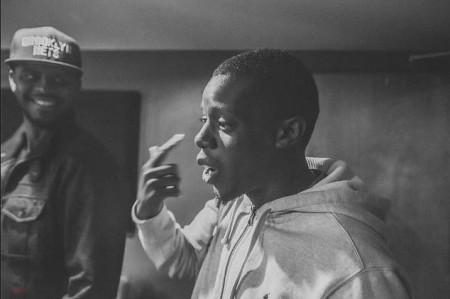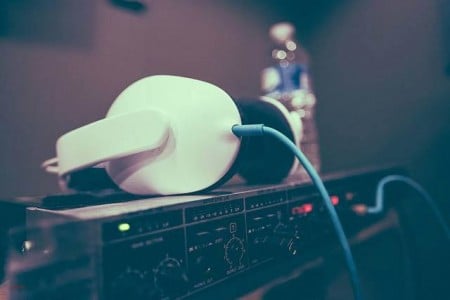Please fill out the following information, and RRFC Admissions will contact you to discuss our program offerings:
Issue #72 – Mentor News
by L. Swift and Jeff McQ
 If someone wants to become a successful music producer or audio engineer, learning to think like an entrepreneur is just as important as learning to run the gear. The landscape of the recording industry is rapidly changing, and when we come across industry professionals who are staying ahead of the curve with fresh ideas to keep their studios relevant and thriving, we feel it’s important to share that information with our student apprentices who will be part of the next generation of the industry.
Enter Yudu Gray, Jr.—founder and CEO of House Studio in Washington, DC, and a Recording Connection mentor for over eight years. Yudu has some innovative ideas about what a good recording studio should be, some of which fly in the face of commonly accepted norms. But it’s definitely working for him: House Studio has been voted the Best Recording Studio in the D.C. area for the past four years, and his client list includes such names as Wale, Waka Flocka, Juvenile and Riff Raff, to name a few. While the studio is particularly known for its R&B (see the client list above), artists from nearly every genre go out of their way to record at House, all because of the studio’s unique approach to servicing its clients.
As it turns out, this is exactly what Yudu had in mind.
“I was at another studio learning and perfecting my craft,” he says. “Over the years, I figured out there were certain things that clients loved and certain things that they hated, and I put together a list of, ‘If I had a studio, I would do this’, and like most studios in the late 2000s, the studio I was at closed…At that time I had gained quite a few years of experience, not just as an engineer/producer, but also on the business side of things, and so I said, “Well, I’m gonna start a studio, and my list of what I would do, I’m gonna use that as the foundation of the studio.” That was about 2009—[in] 2010, we started House Studio.”
If someone wants to become a successful music producer or audio engineer, learning to think like an entrepreneur is just as important as learning to run the gear. The landscape of the recording industry is rapidly changing, and when we come across industry professionals who are staying ahead of the curve with fresh ideas to keep their studios relevant and thriving, we feel it’s important to share that information with our student apprentices who will be part of the next generation of the industry.
Enter Yudu Gray, Jr.—founder and CEO of House Studio in Washington, DC, and a Recording Connection mentor for over eight years. Yudu has some innovative ideas about what a good recording studio should be, some of which fly in the face of commonly accepted norms. But it’s definitely working for him: House Studio has been voted the Best Recording Studio in the D.C. area for the past four years, and his client list includes such names as Wale, Waka Flocka, Juvenile and Riff Raff, to name a few. While the studio is particularly known for its R&B (see the client list above), artists from nearly every genre go out of their way to record at House, all because of the studio’s unique approach to servicing its clients.
As it turns out, this is exactly what Yudu had in mind.
“I was at another studio learning and perfecting my craft,” he says. “Over the years, I figured out there were certain things that clients loved and certain things that they hated, and I put together a list of, ‘If I had a studio, I would do this’, and like most studios in the late 2000s, the studio I was at closed…At that time I had gained quite a few years of experience, not just as an engineer/producer, but also on the business side of things, and so I said, “Well, I’m gonna start a studio, and my list of what I would do, I’m gonna use that as the foundation of the studio.” That was about 2009—[in] 2010, we started House Studio.”
 So what’s different about House? Yudu says one of the biggest differences is the studio’s all-inclusive, relationship-style approach to its clients, taking a personal interest in the projects being brought to the studio.
“The normal [attitude] was: If you are a big celebrity, I’m gonna go all out and make you feel like a king,” says Yudu, “but if you’re a client who’s just paying me an hourly rate, then I literally am looking at the clock, and I’m giving you exactly the amount of hours you paid for, and I don’t care whether the project is completed or not…I just felt like that didn’t make sense, because the bigger artists would come once in a blue moon, and people would rush to take pictures, and put ‘em on their websites and their newsletters. But the people who would come consistently and end up actually spending more money with you would be treated like crap. So we approach everybody the same. We set a standard for how we would approach our relationships, and then we look at our clients as our friends, you know, family and friends coming to visit, and we want them to feel comfortable, hence the name ‘House’…When you bring a project to us, we approach it as if you’re Rihanna, or you’re a Chris Brown—because you could be the next Rihanna. You could be the next Chris Brown.”
How does this attitude play out with House’s clients? Yudu continues, “We don’t look at working with an artist as a two-hour session or four-hour session, but the conversation always starts with, ‘What’s your goal? What do you think is a success when you’re done? Is it completing a song, or completing an EP, or completing a demo, or completing a project?’ And then let’s work around your budget and get that done, and success for both of us is gonna be [in doing it] well. Really, I had never really seen another studio take that approach at that time. It was embraced, and then news traveled fast, because there was a studio that wasn’t just charging people hourly, but was actually sitting and getting to find out what you were working on, and really taking a family style approach as opposed to just an hourly approach.”
So what’s different about House? Yudu says one of the biggest differences is the studio’s all-inclusive, relationship-style approach to its clients, taking a personal interest in the projects being brought to the studio.
“The normal [attitude] was: If you are a big celebrity, I’m gonna go all out and make you feel like a king,” says Yudu, “but if you’re a client who’s just paying me an hourly rate, then I literally am looking at the clock, and I’m giving you exactly the amount of hours you paid for, and I don’t care whether the project is completed or not…I just felt like that didn’t make sense, because the bigger artists would come once in a blue moon, and people would rush to take pictures, and put ‘em on their websites and their newsletters. But the people who would come consistently and end up actually spending more money with you would be treated like crap. So we approach everybody the same. We set a standard for how we would approach our relationships, and then we look at our clients as our friends, you know, family and friends coming to visit, and we want them to feel comfortable, hence the name ‘House’…When you bring a project to us, we approach it as if you’re Rihanna, or you’re a Chris Brown—because you could be the next Rihanna. You could be the next Chris Brown.”
How does this attitude play out with House’s clients? Yudu continues, “We don’t look at working with an artist as a two-hour session or four-hour session, but the conversation always starts with, ‘What’s your goal? What do you think is a success when you’re done? Is it completing a song, or completing an EP, or completing a demo, or completing a project?’ And then let’s work around your budget and get that done, and success for both of us is gonna be [in doing it] well. Really, I had never really seen another studio take that approach at that time. It was embraced, and then news traveled fast, because there was a studio that wasn’t just charging people hourly, but was actually sitting and getting to find out what you were working on, and really taking a family style approach as opposed to just an hourly approach.”
 Another way in which House’s philosophy cuts against the grain? Seeing the digital age of home recording as an asset rather than a threat, and working with it, rather than against it.
“When I first got into engineering, it was extremely rare for anyone on the technical side of things to be less than 35 or 40,” Yudu says. “When you have a 17, 18-year old kid coming in and using Fruity Loops in 2008, they were laughed at, they were shunned, like, ‘Why would I want you in my studio with all this gear?’… Well now, there are kids who have 20 or 30 number one songs on Billboard who only know how to use Fruity Loops, who [only] come to the studio to get it mixed and mastered…I just think it was a big change very quickly and everybody didn’t adjust. But on the other side of it, you’re finding that there are now studios out there who really are embracing this younger culture of home based studios and producers who have the knowhow, but just need a home; and that’s again the idea of House Studio.”
Perhaps the best part of all this (at least for us) is that Yudu has the same generous spirit when it comes to training his apprentices. Take, for example, Recording apprentice Quardrelius Chance, who told his mentor that he had plans to build a studio. Instead of viewing him as a competitor, Yudu used it as a teaching opportunity.
“[I said,] ‘Well, if that’s what you want, then we have an idea of success now. So now, we can both work towards that and we can tailor your weekly one-on-ones with specific questions that’ll help you with what it is that you’re trying to do.’…He got some pieces from us, and we went over there and checked it out, and he got some sound foam from us that we were getting rid of, and he literally built it out from day one.”
Another way in which House’s philosophy cuts against the grain? Seeing the digital age of home recording as an asset rather than a threat, and working with it, rather than against it.
“When I first got into engineering, it was extremely rare for anyone on the technical side of things to be less than 35 or 40,” Yudu says. “When you have a 17, 18-year old kid coming in and using Fruity Loops in 2008, they were laughed at, they were shunned, like, ‘Why would I want you in my studio with all this gear?’… Well now, there are kids who have 20 or 30 number one songs on Billboard who only know how to use Fruity Loops, who [only] come to the studio to get it mixed and mastered…I just think it was a big change very quickly and everybody didn’t adjust. But on the other side of it, you’re finding that there are now studios out there who really are embracing this younger culture of home based studios and producers who have the knowhow, but just need a home; and that’s again the idea of House Studio.”
Perhaps the best part of all this (at least for us) is that Yudu has the same generous spirit when it comes to training his apprentices. Take, for example, Recording apprentice Quardrelius Chance, who told his mentor that he had plans to build a studio. Instead of viewing him as a competitor, Yudu used it as a teaching opportunity.
“[I said,] ‘Well, if that’s what you want, then we have an idea of success now. So now, we can both work towards that and we can tailor your weekly one-on-ones with specific questions that’ll help you with what it is that you’re trying to do.’…He got some pieces from us, and we went over there and checked it out, and he got some sound foam from us that we were getting rid of, and he literally built it out from day one.”
 For his students, Yudu sees it as an opportunity to pay it forward in return for the generosity that others in the industry continue to show him—most notably, Grammy-winning producer Young Guru.
“He’s so down-to-earth, it’s ridiculous,” Yudu says about his friend. “He makes you forget in the first 10 minutes of talking to him that he’s like, a living legend…His mentor, Chucky Thompson, was also one of my mentors, and he connected us a few years ago, and that’s how we started working. We did a few workshops together, and we kind of worked on our projects in the past together. Any time he’s in D.C., he always checks on us. Like, even if it’s just a text message to say, ‘Hey, little brother, I’m going to be in town, just saying hi.’ …He motivates me because as we continue to grow, I make sure that a lot of the apprentices who have graduated, I’ll just shoot them a random text or email just to say ‘Hey, what you working on, how you been? Send me something.’ Because if Guru, who travels the world and is doing this with Jay Z and Beyoncé and Rihanna, can do that for me, who am I to not to do it for my apprentices?”
Now, at the helm of one of the DC-area’s most popular and successful recording studios, Yudu Gray still sees room to grow, and hopes his innovative approach will expand to influence others. “Perfect scenario, House Studio will become the standard for how studios operate,” he says. “Our philosophy will be embraced and adopted and/or House Studio itself will be in multiple cities, in multiple countries, and become a home to artists everywhere, because I feel like what we did with DC and the DC music scene could be duplicated anywhere there are up and coming creatives looking for a home.”
For his students, Yudu sees it as an opportunity to pay it forward in return for the generosity that others in the industry continue to show him—most notably, Grammy-winning producer Young Guru.
“He’s so down-to-earth, it’s ridiculous,” Yudu says about his friend. “He makes you forget in the first 10 minutes of talking to him that he’s like, a living legend…His mentor, Chucky Thompson, was also one of my mentors, and he connected us a few years ago, and that’s how we started working. We did a few workshops together, and we kind of worked on our projects in the past together. Any time he’s in D.C., he always checks on us. Like, even if it’s just a text message to say, ‘Hey, little brother, I’m going to be in town, just saying hi.’ …He motivates me because as we continue to grow, I make sure that a lot of the apprentices who have graduated, I’ll just shoot them a random text or email just to say ‘Hey, what you working on, how you been? Send me something.’ Because if Guru, who travels the world and is doing this with Jay Z and Beyoncé and Rihanna, can do that for me, who am I to not to do it for my apprentices?”
Now, at the helm of one of the DC-area’s most popular and successful recording studios, Yudu Gray still sees room to grow, and hopes his innovative approach will expand to influence others. “Perfect scenario, House Studio will become the standard for how studios operate,” he says. “Our philosophy will be embraced and adopted and/or House Studio itself will be in multiple cities, in multiple countries, and become a home to artists everywhere, because I feel like what we did with DC and the DC music scene could be duplicated anywhere there are up and coming creatives looking for a home.”
 His advice for the up-and-comers—especially those who want to break into producing and engineering, or who want to build a studio? “I started this from nothing, so it’s definitely possible,” he says, “but you have to understand how much work was put into building this, one microphone at a time, one speaker at a time, one piece of software at a time, and we keep continuing to grow and build.
“It all goes down to the relationships,” he continues, “making sure that you treat people the way you want to be treated…It’s got to feel like home…We’ve moved studios since the first studio we had, and then we ran out of space, and moved to a bigger space. The second we moved, that old space became a shell, and people went there to think about renting it out and maybe using our infrastructure, and they were just like, ‘It doesn’t feel the same.’ I mean, we didn’t tear walls down. We didn’t do anything drastic. We just left. It’s not the space: it’s the people. It’s the relationship.”
His advice for the up-and-comers—especially those who want to break into producing and engineering, or who want to build a studio? “I started this from nothing, so it’s definitely possible,” he says, “but you have to understand how much work was put into building this, one microphone at a time, one speaker at a time, one piece of software at a time, and we keep continuing to grow and build.
“It all goes down to the relationships,” he continues, “making sure that you treat people the way you want to be treated…It’s got to feel like home…We’ve moved studios since the first studio we had, and then we ran out of space, and moved to a bigger space. The second we moved, that old space became a shell, and people went there to think about renting it out and maybe using our infrastructure, and they were just like, ‘It doesn’t feel the same.’ I mean, we didn’t tear walls down. We didn’t do anything drastic. We just left. It’s not the space: it’s the people. It’s the relationship.”
or call (800) 755-7597

RRFC is education upgraded for the 21st century.
Get the latest career advice, insider production tips, and more!
Please fill out the following information, and RRFC Admissions will contact you to discuss our program offerings:
Stay in the Loop: Subscribe for RRFC news & updates!
© 2025 Recording Radio Film Connection & CASA Schools. All Rights Reserved.
